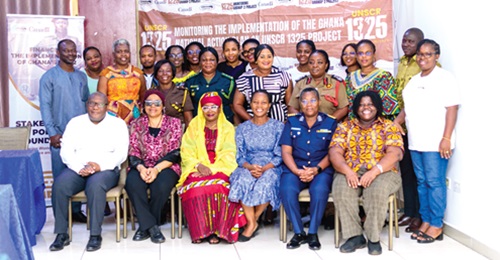A stakeholders policy dialogue has underscored the urgent need for a bold shift from donor dependency to domestic resource mobilisation in funding women’s peace and security (WPS) issues.
The stakeholders also stressed the need for a strategic and sustainable financing of Ghana’s National Action Plan Two (GHANAP 2) on WPS, following the transformational role of women in leadership.
The dialogue was organised by the Foundation for Security and Development in Africa (FOSDA) — a women, peace and security think tank — at a policy on ‘Financing of the Ghana National Action Plan (GHANAP 2) for implementing the United Nations Security Council Resolution 1325 on Women, Peace and Security agenda.
GHANAP 2 is the second iteration of the country's plan to implement the United Nations Security Council Resolution 1325 on Women, Peace and Security.
It is a five-year plan, running from 2020 to 2025 and is focused on building inclusive, secure and peaceful societies for women and girls in Ghana.
The plan aims to ensure women's full participation in conflict prevention, resolution, peace negotiations, mediation and crisis management.
Shifting funding narrative
The Executive Director, FOSDA, Theodora Willams-Anti, said “the dialogue was the moment we shifted the financing narrative, from scarcity to sustainability, from ad hoc to institutionalised support”.
She said FOSDA was shifting the funding narrative of WPS based on the rising concerns over financial constraints, which continue to pose significant challenges to the fulfilment of the benefits of the WPS agenda and the need for domestic financing of GHANAP 2.
Mrs Williams-Anti said recent independent monitoring by FOSDA revealed a notable increase in the implementation of GHANAP 2 , rising from approximately 20 per cent in 2023 to almost 60 per cent in the first quarter of 2025, saying the progress was largely attributed to the collaborative efforts of both state and non-state actors, and primarily supported by donor funding.
She said sustainable and predictable funding was essential for the country to meet these targets to sustain the momentum, citing examples from countries like Canada, Nepal, Jordan and the Philippines, where intentional financing mechanisms had bolstered Women, Peace and Security efforts.
She urged Ghana to make strategic political choices to imbibe WPS priorities into national and local budgets by involving the private sector as well as the establishment of dedicated funding mechanisms for women-led networks and peacebuilders.
The Research Lead at FOSDA, Solomon Okai, in a presentation on ‘Financing the Ghana National Action Plan (GHANAP) on UNSCR 1325 on WPS, said emerging conflicts on the continent were a threat to the goals and objectives of the GHANAP, and therefore said significant attention was required.
He said currently there were global uncertainties, hence the impact on donor support signalled the need for a shift to domestic financing
Mr Okai said Ghana needed a total of GH¢341 million to implement GHANAP 2, and this commitment, he said, represented 0.02 per cent and 0.12 per cent of nominal Gross Domestic Product (GDP) and the 2025 budget, respectively.
The Deputy Director, Global Affairs Canada, Krista House, who joined the discussions virtually, said through the Elsie Initiative, Canada and its global partners were striving to identify and address barriers to women’s meaningful participation in peacekeeping to ensure the equality that all peacekeepers deserved alongside the operational benefits that diversity fostered.
The Elsie Initiative Senior Liaison Officer at the Canadian High Commission, Ghana, Bertha Desmennu, in her remarks said the initiative sought to go beyond numerical targets to ensure that women were represented across the ranks and functions in non-traditional roles and positions of authority, and in enabling environments that offered parity of deployment conditions.
She said without adequate financing, national action plans could not deliver the transformative impact they promised, adding that Canada was proud to be a longstanding partner in advancing the WPS agenda globally and in Ghana.
Writer’s email:rebecca.quaicoe-duho@graphic.com.gh

